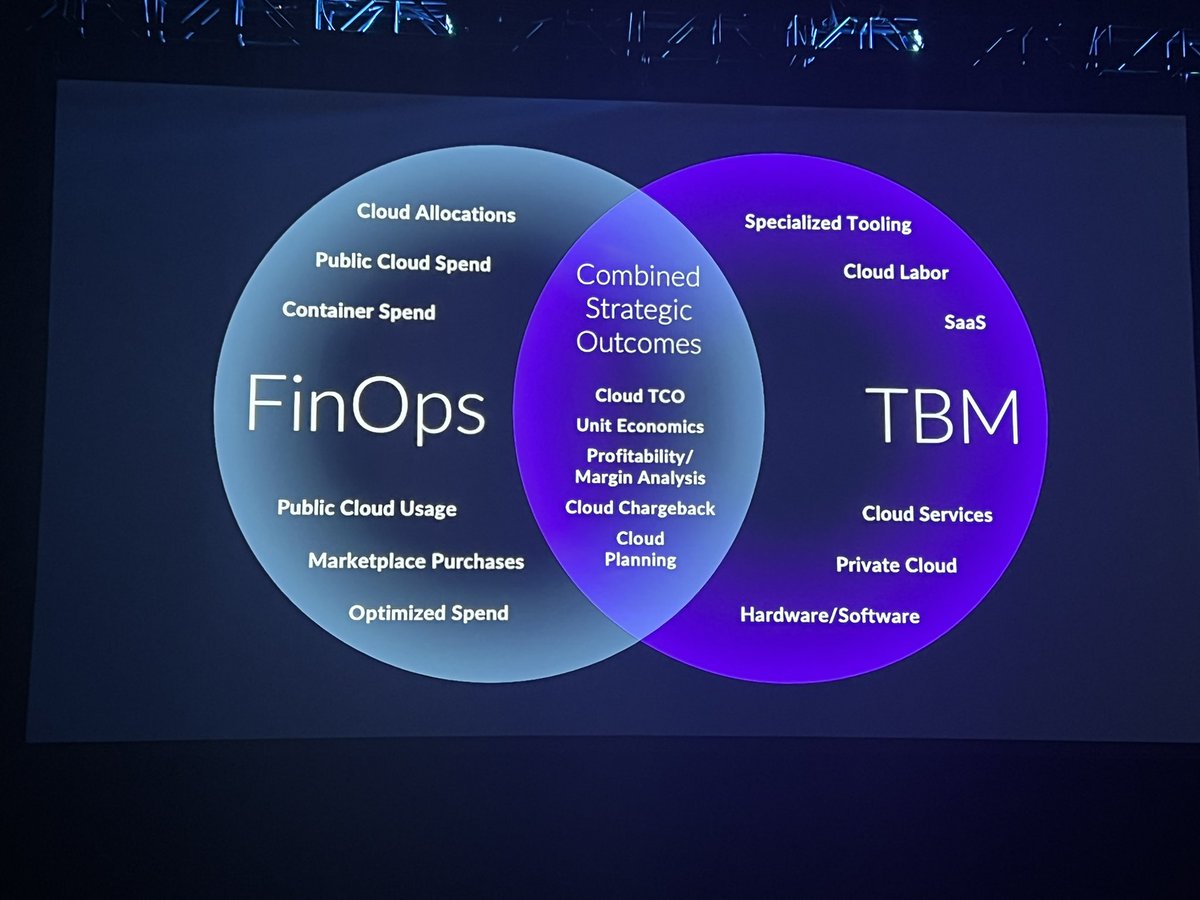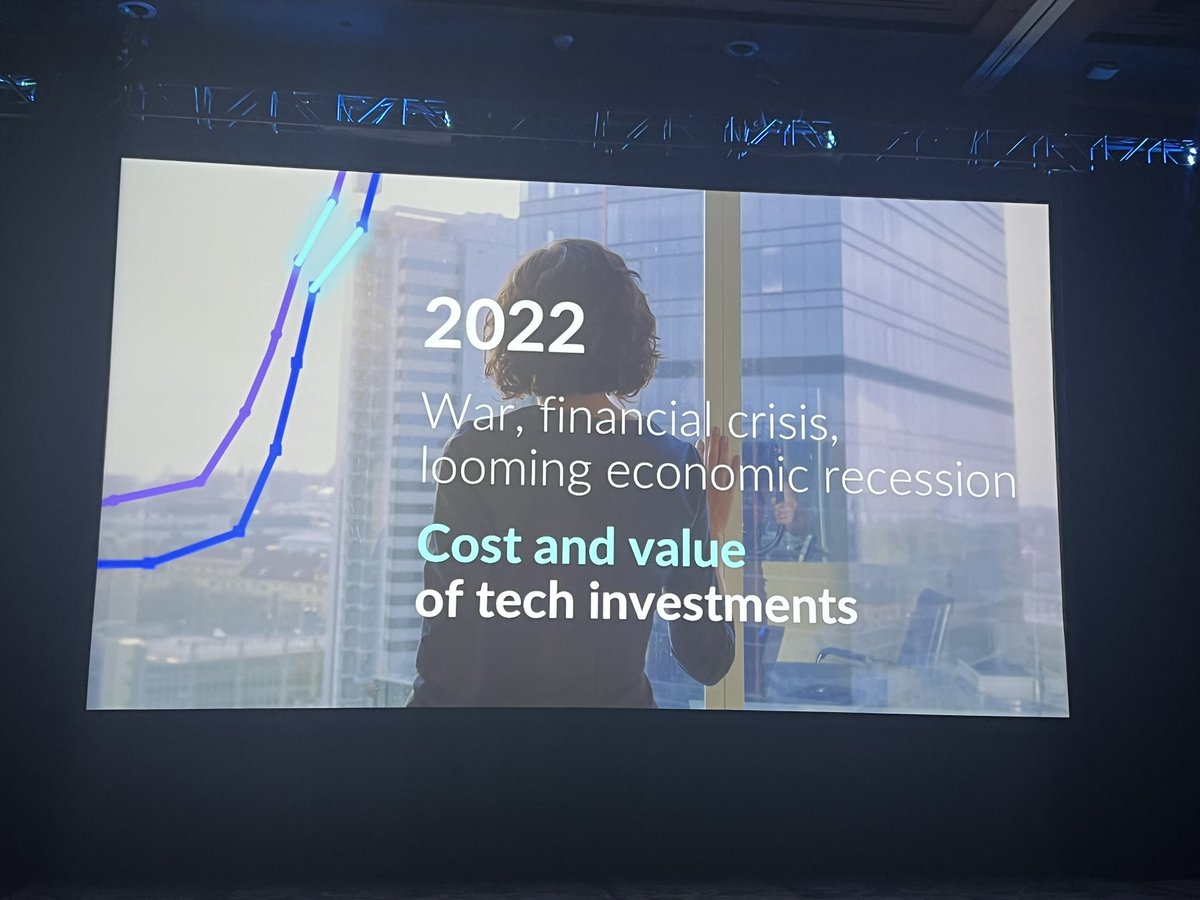
Gass points out that the technology business management journey is just beginning even after 10 years #tbmc22 

Gass introduces Apptio CEO Sunny Gupta, who establishes that every company is digital & tech is core to business #tbmc22 

Gupta looks back at 15 years of Apptio gatherings and how executives now ask how technology is creating fundamental value in the enterprise. #tbmc22 

The first decade of Apptio was focused on technology consumption, not necessarily immediate action #tbmc22 

Gupta states that there were clients who were recalculating tech budgets several times a week in 2020 as scenarios and company needs changed #tbmc22 

2021 were the good times for spending: unprecedented access and cash #tbmc22 

And now 2022, a time of volatility, crisis, and pulling back #tbmc22 

Gupta brings up two fundamental trends around the cloud and productization #tbmc22 

Love how Gupta is bringing up the obsolescence of annual planning and the need for continuous planning supported with visibility and automation #tbmc22 

The @targetprocess acquisition was about adding work management to budget and cost management #tbmc22 

Ken Rogers, who manages over $3 billion in spend, takes the stage to discuss the value of Apptio over the past couple of years. #tbmc22 

Rogers first thanks the audience for their willingness to spend on expedited passport renewal fees, a big money maker for the Department of State! #tbmc22 

More seriously, Rogers brings up the challenge of making everyone go remote while having to defend his budget to the House and Senate. Gives example of having 48 hours to respond to a $120 million budget cut proposal #tbmc22 

Gupta brings up the operational and innovation arms of technology management along with challenges that this two sided approach brings #tbmc22 

Technology is not just a challenge of demand-driven cloud, but a productization and business context challenge #tbmc22 

Gupta introduces Richard Phillips of Legal & General, a veteran of three Apptio deployments across different companies #tbmc22 

Phillips discusses how tech management has shifted over the past decade from getting to chargeback/showback to demonstrating more holistic front office business value with TBM #tbmc22 

Gupta shows the evolution of TBM capabilities from IT to business value #tbmc22 

Gupta brings up the importance of bringing in data once and having a variety of capabilities as a result #tbmc22 



Now taking the stage, Larry Blasko to discuss IT management with UPS #tbmc22 

Ken Finnerty and Jim McGrath of UPS take the stage to discuss how they manage their $6 billion of tech to support business innovation #tbmc22 

Interesting to hear about UPS’ investments in AI and logistics while dealing with disruptive technologies that both help UPS and allow startups to nibble away at the edges of UPS value prop #tbmc22 



Finnerty brings up 4 key investment areas:
Cloud native composable software
Data and analytics
Agile delivery
DevSecOps automation
#tbmc22
Cloud native composable software
Data and analytics
Agile delivery
DevSecOps automation
#tbmc22
McGrath brings up the need for discipline in managing IT and defining relevant KPIs
Finnerty adds interest in cloud FinOps and the challenge of aligning IT cost to business architecture
#tbmc22
Finnerty adds interest in cloud FinOps and the challenge of aligning IT cost to business architecture
#tbmc22
Jason Byrd of Accenture shows up as a 10 yr veteran to discuss what is new in TBM & what is raising the bar #tbmc22 

Byrd shares recent research results that a majority of companies struggle to achieve expected cloud computing results #tbmc22 

I love this intersection. I started an analyst firm 9 years ago focused on this intersection and it has been the center of my work ever since #tbmc22 

Spend priorities for tech enabling CxOs: cloud, modernization, & AI #tbmc22 

Accenture’s survey of cost transformation goals are led by decision making and defining optimal organizational cost structure: areas often ignored in IT #tbmc22 

Keith Barthelmeus, Brinks’ CFO, discusses their TBM program to bridge tech consumption with business drivers #tbmc22 



Duncan Wardle takes the stage, gets the audience on their feet, and splits them into groups of two, giving each roles as experts in esoteric fields #tbmc22 



Wardle points out that if you say that your organization calls itself a consumer and client focused company and judges itself on quarterly results, you’re not in a consumer and client focused firm. #tbmc22
@threadreaderapp please unroll!
• • •
Missing some Tweet in this thread? You can try to
force a refresh







